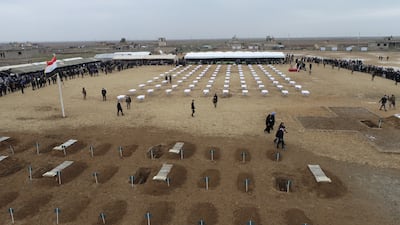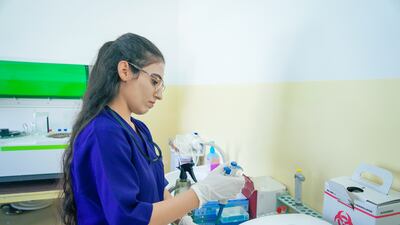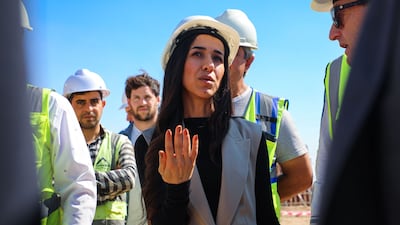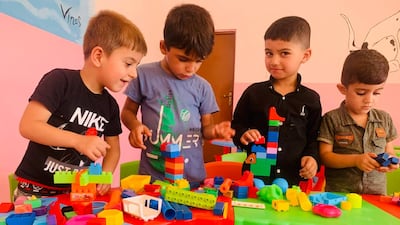Thursday marks nine years since the darkest day in Nadia Murad’s life - the day ISIS rolled into Sinjar, a predominantly Yazidi city in north-western Iraq, slaughtering dozens of men and kidnapping hundreds of women.
The Yazidis, a Kurdish-speaking religious minority, were a major target for ISIS, which persecuted them for their beliefs.
By August 15, ISIS had reached Kocho, a largely agrarian community of about 1,700 people 20 kilometres to the south.
There, Ms Murad was separated from her mother, brothers and stepbrothers who, along with 600 others, were executed. She and hundreds of other Yazidi girls and women were taken to Mosul, where they were enslaved, raped and sold by ISIS militants.
Within weeks, however, she had escaped and by early 2015, found herself living in a container in a refugee camp in the town of Dohuk, her life utterly upended.
Since those dark days, Ms Murad, 30, has gone on to become one of the most famous advocates for survivors of sexual violence in war.
But the 2018 Nobel Peace Prize laureate is still furious.
“I gave everything of myself to tell our story – I wanted to be the last girl to endure this," she tells The National.
"But since 2014, thousands more women have been raped and abused in conflict zones. It surprises and shocks me that this is something that the world can happily live with.
“I am hugely discouraged by the lack of will by the international community to tackle the factors that make women and girls vulnerable to sexual violence in conflict.”
She says that despite thousands of pieces of evidence having been collected by the UN as well as her organisation, Nadia’s Initiative, only three ISIS members have been prosecuted for their roles in enslaving and brutalising Yazidi women and girls.
“What message does this send both to survivors and other perpetrators?” she asks.
“It says, ‘You can rape, you can abuse and you can use sexual violence as a weapon of war, all without punishment.’ Militants around the world, in Russia, Sudan, DRC [Democratic Republic of the Congo] and Yemen are raping women with impunity.”
More than 2,000 Yazidi women and children are believed to still be held captive by ISIS terrorists or their supporters in the remote border regions of northern Iraq and Syria.
On Thursday, the organisation released its Status of Sinjar Report for 2023, which found that more than a third of Yazidis displaced by the ISIS invasion in 2014 have still not been able to return to their homes.
“By the time they were defeated in 2017, 80 per cent of infrastructure and 70 per cent of homes were in ruins,” says Ms Murad.
“So hundreds of thousands of Yazidis are stuck in displacement camps – sometimes only two hours away from their old home.”
Despite the ongoing trauma and enormous challenge of rebuilding thousands of lives, some progress has been made.
In June, six Yazidi women kidnapped as children in 2014 were rescued in Syria and repatriated to Kurdistan, where they have been undergoing psychosocial care.
Last September, an 18-year-old woman who was abducted from Ms Murad’s home village around the same time that she was taken was rescued from Al Hol camp in north-eastern Syria after the Kurdish forces guarding the camp uncovered covert ISIS activities there.
But securing their release is only a first step.
“Women who have survived conflict-related sexual violence are best placed to know what support they need,” says Ms Murad.
“But they need reparations, and that could be in the form of money, shelter or healthcare, and they need justice.”
As well as founding Nadia’s Initiative in 2018, Ms Murad has establish the Global Survivors Fund, an organisation that works to help secure reparations for survivors of sexual violence in war, alongside Denis Mukwege, with whom she shared the Nobel Peace Prize.
In Sinjar, Nadia’s Initiative is focusing its efforts on helping the Yazidi community recapture some semblance of normality.
With many Yazidi men murdered or still missing, initiatives supporting women-led households and their businesses are playing a key role in helping communities rebuild their lives. That means constructing new schools and childcare facilities for children as well as water and electrical infrastructure.
In recent months, Ms Murad returned to her home village of Kocho, where in February 2021, the remains of more than 100 local people killed by ISIS were reburied.
“It was heart-wrenching,” she recalls.
Aside from the challenges of rebuilding their lives, Yazidis in Iraq continue to face differences with other groups. In April, Yazidis in the city of Sinjar were accused of setting fire to a mosque, which then fuelled an online hate campaign against members of the group.
Many Yazidis, fearing hostilities from other groups and still traumatised by the events of recent years, have immigrated to Europe or Canada. Then there are the heart-breaking stories of rescued children who, following years of captivity, have forgotten their Yazidi customs, identity and family, preferring to return to their ISIS captors.
And the challenge of securing justice for survivors of sexual violence before it is too late is a huge one for Ms Murad.
“What discourages me are the leaders we have now,” she says.
“The politicians have been too slow to prosecute ISIS members and seem content to let rape be an accepted side effect of war.”





